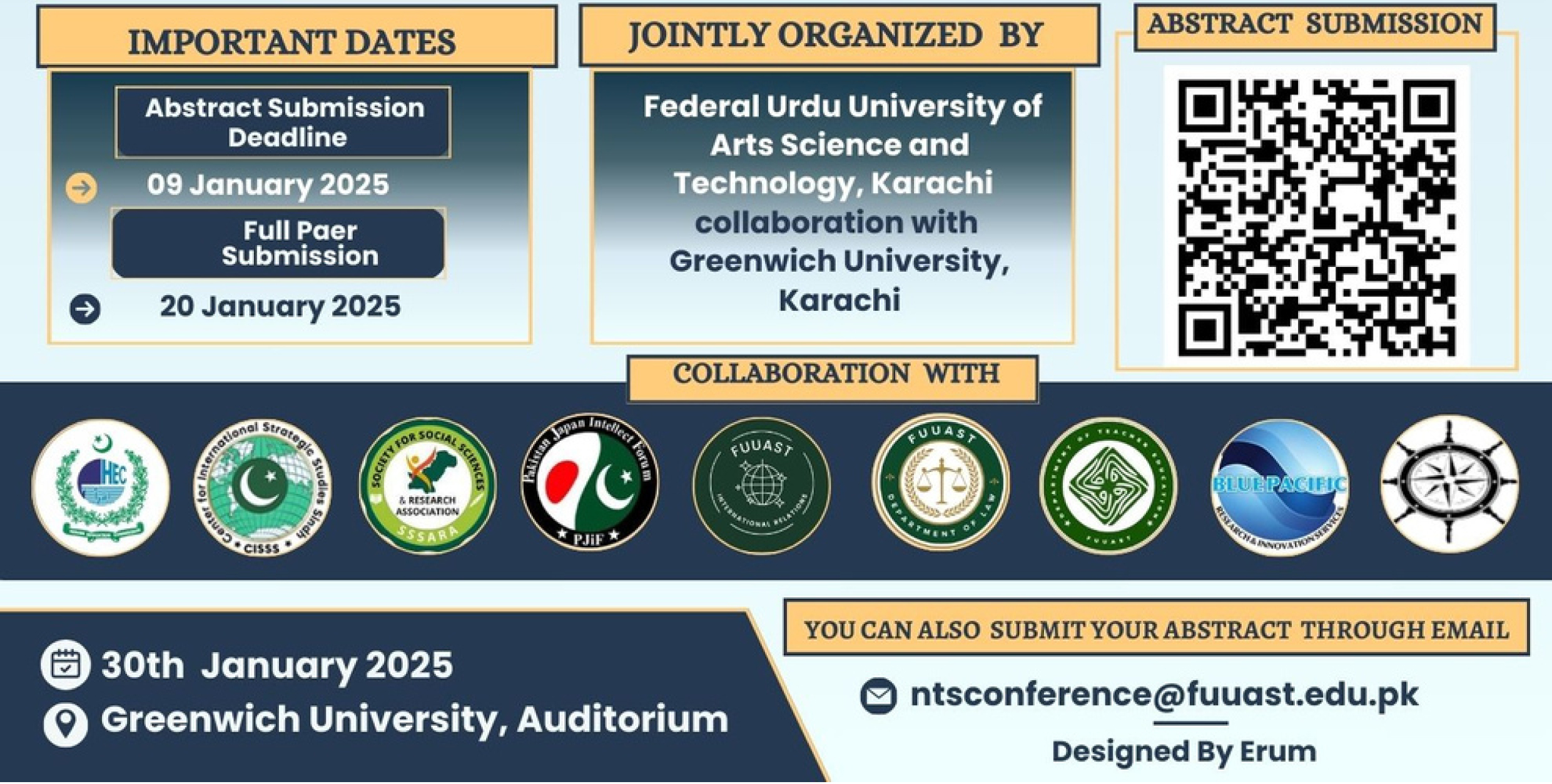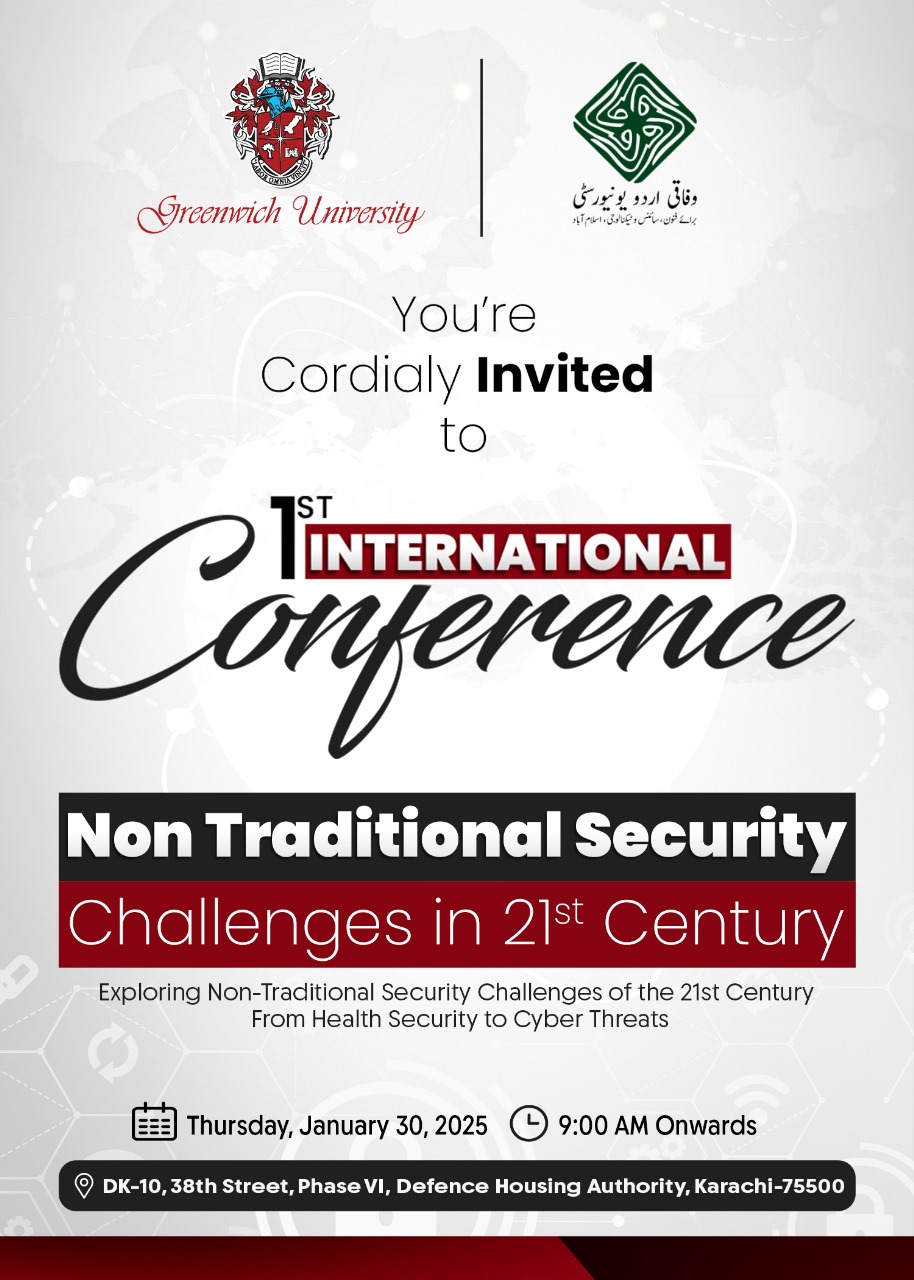
The Purpose of Conference
The conference aims to address non-traditional security (NTS) challenges in South Asia, exploring policy frameworks and developing strategic responses. Non-Traditional Security challenges. In an increasingly interconnected world, non-traditional security (NTS) challenges—ranging from climate change, pandemics, and cyber threats to transnational crimes and resource scarcities—are reshaping the global security landscape. Unlike traditional statecentric security concerns, Non-Traditional Security threats often transcend borders, requiring innovative, collaborative approaches to address their systemic impacts.
The conference fosters regional cooperation and global resilience by examining multilateral frameworks and best practices for addressing global threats. By exploring regional and global implications of challenges, the conference promotes collaborative responses to shared security challenges.
South Asia is faced with issues including, rapid urbanization, environmental vulnerabilities, and technological shifts, stands at the forefront of these challenges. Climate change and is adversely affected by them, and there is a need to optimally address them. Pakistan faces compounded threats from water scarcity, climateinduced migration, health crises, and digital vulnerabilities. Understanding these emerging threats and developing strategic responses is crucial not just for national stability but also for fostering regional cooperation and global resilience.
The event brings together experts from academia, policy, and practice to discuss governance, security, and development implications of non traditional security challenges. This interdisciplinary approach fosters a comprehensive understanding of the complex issues surrounding non traditional security challenges.
Through interactive sessions and case studies, the conference identifies practical solutions for building resilience against non traditional security challenges. This includes exploring strategies for improving governance and institutional resilience, as well as examining the role of technology in addressing non traditional security challenges.
This conference will provide an interdisciplinary platform to:
- Deepen understanding of Non-Traditional Security challenges in South Asia.
- Discuss their implications for governance, security, and development.
- Develop actionable strategies to address these threats at national, regional, and global levels.
The conference contributes to long-term understanding and strategic responses to non traditional security challenges, enhancing regional stability and global security. By facilitating the exchange of ideas and best practices, the conference promotes ongoing collaboration and knowledge-sharing among experts and stakeholders
Key Objectives
- Framing the Issue: To establish a shared understanding of NTS challenges and their distinction from traditional security paradigms.
- Regional and Global Implications: To explore how NTS challenges reshape governance, societal resilience, and regional stability.
- Action-Oriented Dialogue: To identify practical, policy-oriented solutions for building resilience against NTS threats.
- Collaborative Network: To foster partnerships between academics, policymakers, and practitioners for ongoing research and advocacy.
Core Themes
Understanding Non-Traditional Security:
- What constitutes NTS?
- Evolution of security concepts in the 21st century.
- Bridging the gap between traditional and non-traditional approaches.
Educational Resilience Against NTS Challenges:
- Ensuring continuity of education during crises (pandemics, conflicts, climate events).
- Building disaster-resilient school infrastructure.
- The role of online education in bridging gaps during emergencies.
Environmental Law Security:
- Climate change as a multiplier of security risks.
- Resource insecurity (water, food, and energy) and its geopolitical ramifications.
- South Asia’s vulnerability and opportunities for regional cooperation.
Health Security:
- Global pandemics, bioterrorism, and public health infrastructure.
- COVID-19 as a case study for future preparedness.
- Building healthcare resilience in low- and middle-income countries.
Economic, Trade routes and Energy Security:
- The rise of economic interdependence and its dual nature as a threat and opportunity.
- Challenges in transitioning to sustainable energy systems.
- Strategic policies for mitigating economic shocks.
Cyber and Technological Security:
- Cyberattacks, data privacy concerns, and digital misinformation.
- Balancing innovation with the growing vulnerabilities of interconnected systems.
- Developing robust cybersecurity frameworks for South Asia.
Human Trafficking and Humanitarian Law:
- Migration, human trafficking, and organized crime as global challenges.
- Regional frameworks for managing shared threats.
- The role of international organizations and agreements.
Policy and Governance Responses:
- Strategies for improving governance and institutional resilience.
- The role of multilateral frameworks in addressing global threats.
- Lessons from international case studies for South Asia.
For More Information
- Contact Us: Email: [email protected]
- Syed Shahab Uddin (HoD IR, FUUAST) Phone: +92300 0801061

